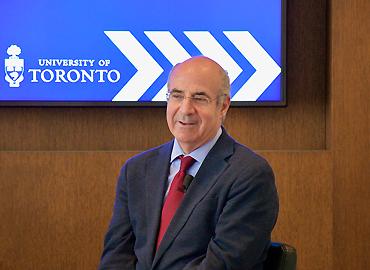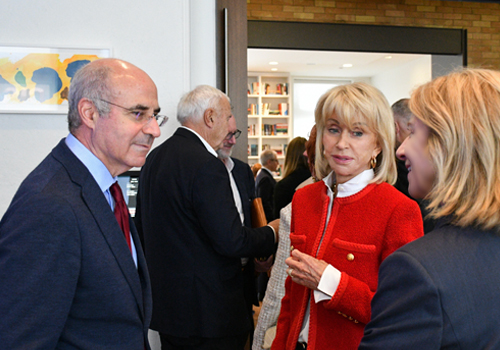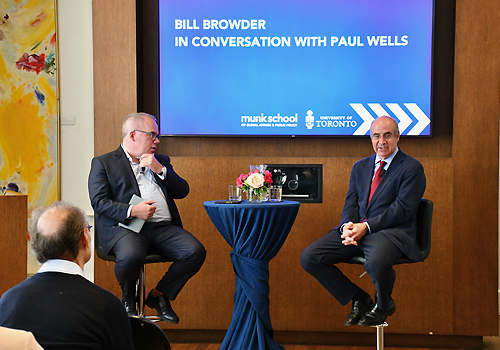'We're in a new cold war': Bill Browder on Putin and Ukraine war outcome

Bestselling author and human rights activist Bill Browder took the stage at the Munk School of Global Affairs & Public Policy on May 11 during an exclusive conversation with Munk’s Journalist-in-Residence Paul Wells, host of the popular podcast The Paul Wells Show.
They discussed a new era of international conflict that pits democracy against totalitarian regimes and addressed Browder's attempt to warn the world about Russian President Vladimir Putin’s dark intentions that culminated in the invasion of Ukraine.
Browder takes no pleasure in the validation of his fears.
“I've been screaming from the rooftops about this for years, and the answer is: I feel terrible. I feel horrible because I was a lonely voice that was pushed away,” says Browder, who was in Toronto to be honoured as a Friend of Ukraine at the Tryzub Awards, created by the Myhal Family Foundation.
“We had an opportunity at every step of the way, with every crime Putin committed, every murder and every war crime, to get tough on him and we didn't. We never got tough on Putin in the West.”
Browder earned fame as CEO of Hermitage Capital. As Russia’s biggest investor, he amassed $4 billion in assets that turned out to be worthless, pilfered by Russian oligarchs and backed by Russian President Vladimir Putin, who was building his own mega fortune.

Browder fired back. He and his Russian lawyer Sergei Magnitsky tried to expose Putin’s shady dealings, leading to Browder’s expulsion from the country. Magnitsky was charged with treason, imprisoned, tortured and murdered behind bars in 2009.
The author of bombshell bestsellers Red Notice and Freezing Order, Browder has dedicated the last 15 years of his life to fighting Putin and the pursuit of justice.
Browder worked with the Canadian government to pass the Sergei Magnitsky Law in 2017, which enables governments to sanction foreign nationals who’ve been involved in major corruption or committed human rights abuses.
When asked if Putin is unfairly targeted by sanctions while other politicians, even Western ones, surround themselves with corrupt characters but aren’t subject to the same punishments, Browder says there’s no point in comparison; democracy has its own way of auditing people in power.
"The entire free world is constantly using the Freedom of Information Act,” Browder says. “It's a misery to be empowered in any country because there's the press. You're not arresting these people; you're not killing them.
“Vladimir Putin is a dictator. He’s a murderous dictator and he deserves everything that's happening to him.”

Well-versed in Russian diplomacy and scandal, Browder is coveted in war rooms, boardrooms and newsrooms. At the Munk School, he’s an intriguing draw for alumni and donors, including founding benefactor Melanie Munk, U of T’s Chancellor Emeritus David Peterson and retired Conservative Senator Nicole Eaton, all of whom came to see him speak.
“Browder was immensely knowledgeable, very compelling,” says Eaton, who voted on Magnitsky’s Law when it passed through the Senate in 2017. “He's someone who's obviously had a lot of practical experience in Russia, not looking at it from 3,000 miles. I found it riveting.”
Attracting speakers like Browder is a testament to Munk’s reputation as the intellectual centre of foreign policy studies in Canada, says Munk School Director Peter Loewen.
“Browder is among the people in this world most responsible for confronting the corruption of Russia, and ringing a massive warning bell about the threat Russia poses to the world, and he’s doing that as clearly as possible.”
Browder thinks the Ukraine war will drag on for years unless a change in the White House cuts essential funding to Ukrainian fighters. According to Browder, Putin is in a fight for his life because losing the war would be a death sentence for the Russian president.
We have the tools to take down Putin, says Browder. If the West plays tough with Russian sympathizers such as South Africa, the free world could tighten its grip on Putin’s imperialistic endeavours.
“I think we're in a new cold war, or hot war, I should say, but in the new war between authoritarians and democracies,” says Browder. “I think the democracies must become a little tougher. We can use our economic weight to get people on the right side.”

